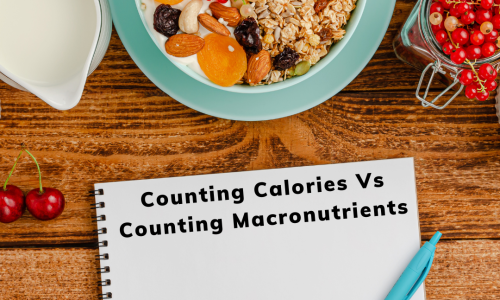Counting Calories Vs Counting Macronutrients

Calories simply refer to the amount of energy contained in the food you consume, and not the food itself. When you eat food, it gets broken down into various pieces from which energy needed for the body to continue its simple function is extracted. Different foods contain different amounts of calories.
Macronutrients, on the other hand, refer to a combination of two words. Macro+nutrients. They are important sources of nutrients that you need to consume in large amounts to have a healthy body. They include carbohydrates, proteins, and fats, and make up a large part of our diet. They all perform different functions including serving as a primary source of energy through the carbohydrates, building and maintaining tissues with proteins, and hormone production and balance by fats. Macronutrients differ from micronutrients which are required in small quantities.
Now that you understand what they are and what they do to your body, it’s time to get onto the juicy parts.
How Do Calories and Macronutrients Affect Your Body?
Remember that while calories are the energy contained in the food that the body uses, they are gotten from macronutrients therefore in a way, the two are connected. Calories play a vital role in weight gain and weight loss; you must be wondering how.
When you consume food, your body takes energy from the macronutrients you’ve eaten to go about its activities, but sometimes you eat a lot of food and after all the necessary conversions, there’s still a lot of energy (calories) left which your body no longer needs at the time. The excess calories are converted and stored as fat reserves in your body which if steadily built, adds to your weight.
Macronutrients play several crucial roles in your body, including:
- Supporting brain development
- Providing assistance in maintaining a healthy immune system
- Regulation of body temperature, supporting metabolism, and much more
Which Should You Watch for the Scale?
If you’re looking to lose weight or watch your weight, then you should be counting your calories. It all boils down to how much food you eat, and how much fat you burn through exercise and other physical activities. Calories contribute fully to your weight gain, and the best way to lose them is by increased physical activities so that the rate at which you consume them is equal to the rate you burn them.
A common misconception where weight loss is concerned is the supposed “No-carbs” diet where people keep away from foods containing carbohydrates, focusing instead on protein-based foods. Carbohydrates are very important to your body and are contained in the vast majority of foods. A deficiency in carbohydrates can result in headaches, fatigue, weakness of the body, and even bad breath!
Counting macronutrients can also help you lose weight because it helps you pay closer attention to your diet by looking up the nutritional properties of the food that make up your diet. Most nutritionists argue, however, that counting macronutrients is an unhealthy way to lose weight, because you don’t select your diet based on the nutritional requirements of your body; you simply make choices based on calculations of the calories these foods contain. Counting macronutrients can also turn into an obsessive behavior which may result in disordered eating.
Be careful. A deficiency in macronutrients can lead to heart disease, stroke, kidney failure, hypoglycemia, and other fatal health complications.
Enough of the bad news now; we’ve got a little something for you!
How to Count Calories the Healthy Way
The first thing you should do is perform a health check. You need to know if your body is in good enough condition for you to begin a daily calorie count. Next, you should find out how many calories you need daily by performing a simple basal metabolic rate calculation (BMR), which tells you how many calories you need after taking your gender, age, height, and current weight into consideration. You can get that done here with our InBody assessment. After that, you can start planning your diet by looking up foods and the calories they contain. Be sure to be mindful of any allergies you might have, and also remember to ensure that your diet contains the right amount of nutrients your body requires. If you need help figuring this out and creating an action plan, contact our nutritionist, Belinda Jones, for a meeting while you stay with us.
Don’t get all caught up in calorie counting. Because we care about you and value your health, we’ve got blogs containing different articles, including some that can point you in the right direction when it comes to weight loss.
Book your stay with us and get yourself into a healthy lifestyle.

